初中英语词汇词组辨析
初中英语词汇词组辨析

56.quite ,very 很,十分1quite a +形容词+名词“一个相当……的……”quite a clever boy 一个相当聪明的男孩2a very+形容词+名词“一个非常……的”a very clever boy 一个非常聪明的男孩57.say,speak,talk,tell 说1say 后接说的内容,He says he likes English very much.2speak 后接语言,I can speak Japanese3talk “讨论,谈论”,可作动词也可作名词,talk about sth 谈论某件事,talk with /to sb 和某人谈话4tell ,“告诉,讲述”tell sb sth 告诉某人某件事,tell a story ,tell a lie 撒谎58.since, for 用于完成时态1since 后接时间点. Lucy has lived there since 1955. Lucy 自从1955年以来一直住在这里。
接“时间段+ago”I have been teaching since 10 years ago. 我教英语有10年了接“一般过去时态的句子”We have known each other since we were young.我们从小就认识。
2for 后接时间段。
We have studied for 9 years.我们学英语已经9年了。
59. so , such,如此,这样。
So /such ……that+否定句子=too……to+动词原形;so/such…+肯定句子=enough to+动词原形1so,修饰形容词或many,much,little,few(so good a boy 如此好的一个男孩(so much difficult 太多的困难He is so young that he can’t go to school=He is too young to go to school.他太小了,不能去上学。
中考词汇总结高频词汇与词义辨析
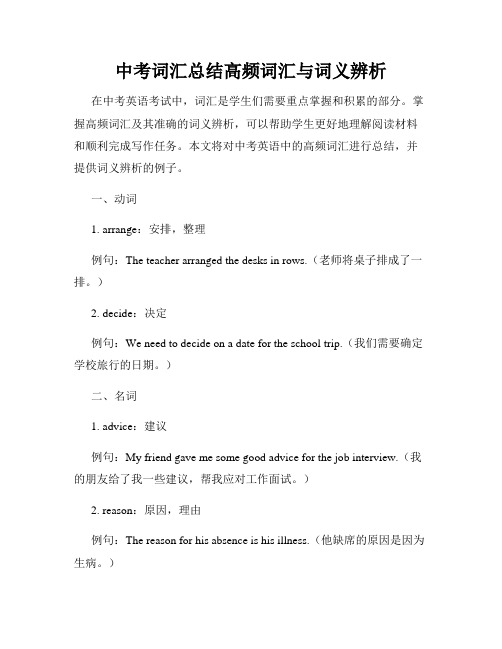
中考词汇总结高频词汇与词义辨析在中考英语考试中,词汇是学生们需要重点掌握和积累的部分。
掌握高频词汇及其准确的词义辨析,可以帮助学生更好地理解阅读材料和顺利完成写作任务。
本文将对中考英语中的高频词汇进行总结,并提供词义辨析的例子。
一、动词1. arrange:安排,整理例句:The teacher arranged the desks in rows.(老师将桌子排成了一排。
)2. decide:决定例句:We need to decide on a date for the school trip.(我们需要确定学校旅行的日期。
)二、名词1. advice:建议例句:My friend gave me some good advice for the job interview.(我的朋友给了我一些建议,帮我应对工作面试。
)2. reason:原因,理由例句:The reason for his absence is his illness.(他缺席的原因是因为生病。
)三、形容词1. polite:有礼貌的例句:Emily is always polite to her elders.(艾米莉对长辈总是非常有礼貌。
)2. honest:诚实的例句:He is an honest person and never tells lies.(他是一个诚实的人,从不说谎。
)四、副词1. quickly:快速地例句:She finished the race quickly and won the first place.(她迅速完成了比赛并获得了第一名。
)2. quietly:安静地例句:Please read quietly in the library.(请在图书馆安静地阅读。
)词义辨析:1. forget与remember虽然forget和remember都有“记住”的意思,但用法上有所不同。
forget表示“忘记”,后接名词或动名词,而remember表示“记得”,后接名词、动名词、动词-ing形式或从句。
初中英语重点短语辨析

初中英语重点短语辨析1. be made of / be made fromⅠ. be made of “由……制成/造”成品看得出原料。
如:The desk is made of wood. 这张桌子是木头制成的。
Ⅱ. be made from “由……制造/成”成品看不出原料。
如;Paper is made from rags.纸是由破布做的。
(已看不出原料)2. be pleased with/ at/ toⅠ. be pleased with “对……人/物,感到满意”介词with后接人或物。
如:① Both Mark and her mother were pleased with the girl. 马克和他妈妈都有喜欢这个女孩。
② I wasn’t very pleased with / at my exam results. 我对自己的考试成绩不太满意。
Ⅱ. be pleased at “对……某事/物,感到满意”。
介词at 常与事物搭配使用。
He was very pleased at the news.他对这个消息感到很满意。
Ⅲ. be pleased to “乐意……;因……而高兴”。
to 不是介词,而是小品词。
后接动词原形。
如:① I shall be pleased to go. 我将乐意去。
② We are quite pleased to be working in this country. 能在这个国家工作,我们是十分高兴的。
3. be sure of/ be sure to do/ be sure thatⅠ.be sure of “确信对……有把握”后接名词、代词或动词-ing 形式,表对客观事物有肯定的认识和判断,主语必须是人。
如:① As David joined our team, we are sure of winning the game this time.由于David参加了我们的球队,我们这次有把握取胜。
初中英语常见的30组词汇辨析!
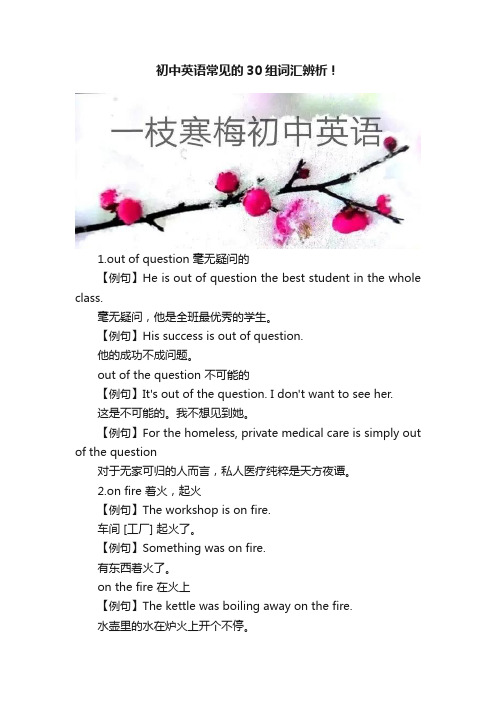
初中英语常见的30组词汇辨析!1.out of question 毫无疑问的【例句】He is out of question the best student in the whole class.毫无疑问,他是全班最优秀的学生。
【例句】His success is out of question.他的成功不成问题。
out of the question 不可能的【例句】It's out of the question. I don't want to see her.这是不可能的。
我不想见到她。
【例句】For the homeless, private medical care is simply out of the question对于无家可归的人而言,私人医疗纯粹是天方夜谭。
2.on fire 着火,起火【例句】The workshop is on fire.车间 [工厂] 起火了。
【例句】Something was on fire.有东西着火了。
on the fire 在火上【例句】The kettle was boiling away on the fire.水壶里的水在炉火上开个不停。
【例句】Put another lump of coal on the fire.往炉火上再加放一块煤。
3.in office 在职的,执政的【例句】He had nothing tangible to show off three years in office.他为官三年,无实绩可言。
【例句】Which political party is in office in your country ?贵国是哪一个政党执政?in the office 在办公室里【例句】He was wanted in the office.有人在办公室找他。
【例句】Would you introduce me to others in the office?你能把我介绍给办公室的其他人吗?4.the doctor and teacher 指一个人,既是医生又是老师。
初中英语300组常用词语辨析完整版

初中英语300组常用词语辨析Lesson495.bloom/flower/blossomⅠ.bloom指观赏用的花。
如:玫瑰;菊花;牡丹等。
Ⅱ.flower是普通用语。
Ⅲ.blossom指果树上的花。
96.boat/shipⅠ.boat“船、艇,”是普通用语。
主要指用浆、篙、帆或引擎的小船、小艇,但有时也指大轮船。
如:1We crossed the river by boat.我们乘船过河。
2They pulled the boat up on to the shore.他们把这条船拖上了岸。
(指小船③When does the boat leave for Shanghai?(指轮船Ⅱ.ship“船、舰,”多指大的航海船只。
如:1The ship is at sea.船厂在航海。
2They went to Guangahou by ship.他们乘船去广州。
97.bold/brave/courageousⅠ.bold“大胆的、勇敢的”着重指大胆、勇敢的气质,表现出有胆量、敢闯或敢于对抗而不畏缩。
如:1Be bold!勇敢些!2It’s very bold of us to v enture to go to sea.我们冒险航海是很勇敢的。
Ⅱ.brave“勇敢的”,应用最广泛,通常指在危险、困难或可怕的情况下表现勇猛而畏缩。
如:1Be brave!勇敢些!2It was brave of him to enter the burning building.他敢进入那燃烧着的房屋,真是勇敢。
Ⅲ.courageous“勇敢的,无畏的”表示由于有勇敢的气质或不屈不挠的精神而能无畏地自觉地对付某种事情,常常用于表示道义上的勇敢。
如:1He is courageous in telling the truth.他敢于讲实话。
2We hope that they will courageously shoulder their responsibilities and overcome all difficulties.我们希望能够勇敢地负起责任,克服一切困难。
初中英语常用词语辨析大全 .

初中英语常用词语辨析A.............................................................1.at the moment\in a moment\for a moment\at the moment=right now"此时此刻",用于现在时。
in a moment = very soon “很快,立即”,一般用于将来时的句子。
for a moment “此刻,一会儿”表示时间的延续。
[例] He is out at the moment.此刻他不在家。
I will come back in a moment.我一会儿就回来。
Hold on for a moment.请稍候。
............................................................. 2.a few/ few(1)a few, few 用来修饰可数名词。
(2)a few “有一些”,表示肯定概念,few 几乎没有,表示否定意义。
[例] The man has been here for many years, so he has a few friends. 这个人在这里住了很多年了,他有一些朋友。
I am a new comer here, so I have few friends here.我刚来到这里,所以我在这里没有几个朋友。
............................................................. 3.a little/ little(1) a little, little 用于修饰不可数名词。
(2) a little “有一些”,表示肯定概念。
little “几乎没有”,表示否定概念。
[例] There is a little water in the glass.杯子里有一些水。
词汇辨析+词组辨析
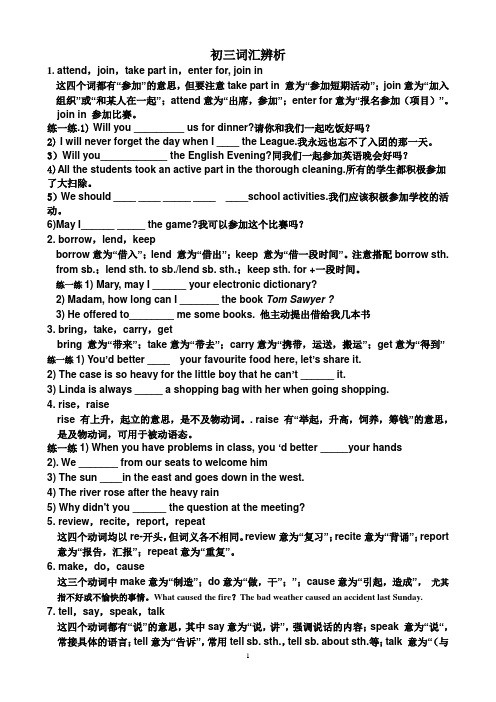
初三词汇辨析1. attend,join,take part in,enter for, join in这四个词都有“参加”的意思,但要注意take part in 意为“参加短期活动”;join意为“加入组织”或“和某人在一起”;attend意为“出席,参加”;enter for意为“报名参加(项目)”。
join in 参加比赛。
练一练.1) Will you _________ us for dinner?请你和我们一起吃饭好吗?2) I will never forget the day when I ____ the League.我永远也忘不了入团的那一天。
3)Will you____________ the English Evening?同我们一起参加英语晚会好吗?4)All the students took an active part in the thorough cleaning.所有的学生都积极参加了大扫除。
5)We should ____ ____ _____ ________school activities.我们应该积极参加学校的活动。
6)May I______ _____ the game?我可以参加这个比赛吗?2. borrow,lend,keepborrow意为“借入”;lend 意为“借出”;keep 意为“借一段时间”。
注意搭配borrow sth. from sb.;lend sth. to sb./lend sb. sth.;keep sth. for +一段时间。
练一练1) Mary, may I ______ your electronic dictionary?2) Madam, how long can I _______ the book Tom Sawyer ?3) He offered to________ me some books. 他主动提出借给我几本书3. bring,take,carry,getbring 意为“带来”;take意为“带去”;carry意为“携带,运送,搬运”;get意为“得到”练一练1) You‟d better ____ your favourite food here, let‟s share it.2) The case is so heavy for the little boy that he can‟t ______ it.3) Linda is always _____ a shopping bag with her when going shopping.4. rise,raiserise 有上升,起立的意思,是不及物动词。
中考英语近义词汇及词组辨析

中考英语近义词汇及词组辨析中考英语考试中,近义词汇及词组的辨析是一个很重要的考点。
同学们在备考过程中应该特别注意掌握这些词汇及词组的区别和用法。
本文将为大家介绍一些常见的近义词汇及词组,帮助同学们更好地应对中考英语。
一、accurate与correctaccurate和correct都表示“准确的”。
它们的区别在于:accurate强调准确度的高,而correct则更多地强调符合规范、正确的。
例如:1. The scientist made accurate measurements. (科学家做出了准确的测量。
)2. Please correct your mistakes in the essay. (请在作文中纠正你的错误。
)二、advice与adviseadvice是名词,意为“建议”或“忠告”,而advise是动词,意为“建议”或“提供意见”。
例如:1. Can you give me some advice on how to learn English? (你能给我一些建议如何学习英语吗?)2. I advise you not to be late for the meeting. (我建议你们不要迟到会议。
)三、borrow与lendborrow和lend都与“借”的概念有关,但使用上有所不同。
borrow表示“借入”,lend表示“借出”。
例如:1. Can I borrow your pen? (我能借用你的钢笔吗?)2. Could you lend me some money? (你能借给我一些钱吗?)四、famous与popularfamous和popular都表示“著名的”,但有所不同。
famous更多地指代某个人或事物在广泛的范围内被人所熟知,而popular则更多地指代某个人或事物在大众之间受欢迎。
例如:1. Mozart is a famous composer. (莫扎特是一个著名的作曲家。
中考英语高频词汇词组语法,重难点语法辨析
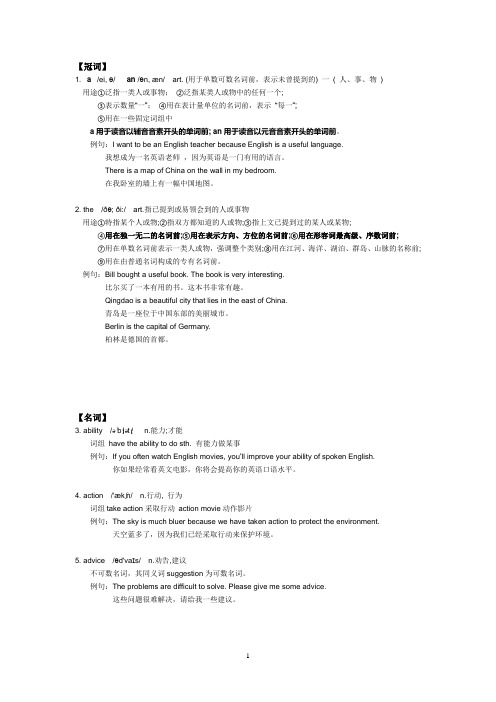
【冠词】1. a /ei, ə/ an /ən, æn/art. (用于单数可数名词前,表示未曾提到的) 一( 人、事、物)用途①泛指一类人或事物;②泛指某类人或物中的任何一个;③表示数量“一”;④用在表计量单位的名词前,表示“每一”;⑤用在一些固定词组中a用于读音以辅音音素开头的单词前; an用于读音以元音音素开头的单词前。
例句:I want to be an English teacher because English is a useful language.我想成为一名英语老师,因为英语是一门有用的语言。
There is a map of China on the wall in my bedroom.在我卧室的墙上有一幅中国地图。
2. the /ðə; ði:/ art.指已提到或易领会到的人或事物用途①特指某个人或物;②指双方都知道的人或物;③指上文已提到过的某人或某物;④用在独一无二的名词前;⑤用在表示方向、方位的名词前;⑥用在形容词最高级、序数词前;⑦用在单数名词前表示一类人或物,强调整个类别;⑧用在江河、海洋、湖泊、群岛、山脉的名称前;⑨用在由普通名词构成的专有名词前。
例句:Bill bought a useful book. The book is very interesting.比尔买了一本有用的书。
这本书非常有趣。
Qingdao is a beautiful city that lies in the east of China.青岛是一座位于中国东部的美丽城市。
Berlin is the capital of Germany.柏林是德国的首都。
【名词】3. ability /əˈbɪlətɪ/ n.能力;才能词组have the ability to do sth. 有能力做某事例句:If you often watch English movies, you’ll improve your ability of spoken English.你如果经常看英文电影,你将会提高你的英语口语水平。
初中英语 词汇辨析总结
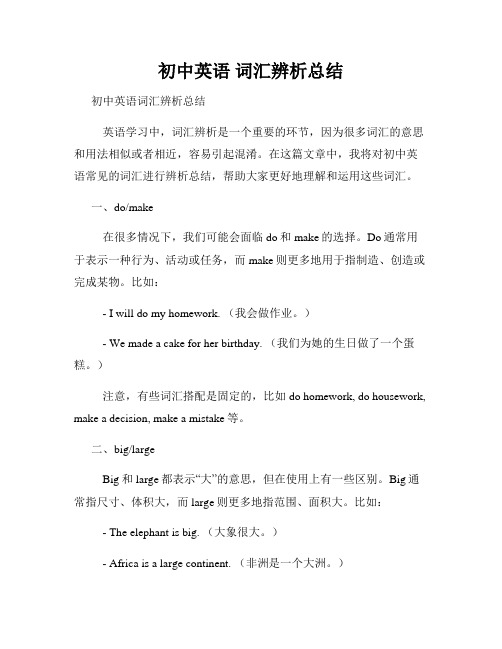
初中英语词汇辨析总结初中英语词汇辨析总结英语学习中,词汇辨析是一个重要的环节,因为很多词汇的意思和用法相似或者相近,容易引起混淆。
在这篇文章中,我将对初中英语常见的词汇进行辨析总结,帮助大家更好地理解和运用这些词汇。
一、do/make在很多情况下,我们可能会面临do和make的选择。
Do通常用于表示一种行为、活动或任务,而make则更多地用于指制造、创造或完成某物。
比如:- I will do my homework. (我会做作业。
)- We made a cake for her birthday. (我们为她的生日做了一个蛋糕。
)注意,有些词汇搭配是固定的,比如do homework, do housework, make a decision, make a mistake等。
二、big/largeBig和large都表示“大”的意思,但在使用上有一些区别。
Big通常指尺寸、体积大,而large则更多地指范围、面积大。
比如: - The elephant is big. (大象很大。
)- Africa is a large continent. (非洲是一个大洲。
)三、happy/gladHappy和glad都表示“高兴的”意思,但在使用上有细微差异。
Happy更通用,可以用于形容各种情绪的高兴,而glad则更强调突发的高兴、出乎意料的喜悦。
比如:- I am happy to see you. (见到你我很高兴。
)- We are glad to hear the news. (听到这个消息我们很高兴。
)四、buy/purchaseBuy和purchase都表示“购买”之意,但buy更常用,更口语化,而purchase则更正式一些。
在日常交流中,我们通常使用buy。
比如: - I bought a new book. (我买了一本新书。
)- He purchased a car last week. (他上周购买了一辆车。
初中英语300组常用词语辨析(3)

初中英语300组常用词语辨析(3)§201grow / keep / raise / plantⅠ. grow & plant 都可表示“种植”如种植草、树、苗、花卉粮食等植物。
grow 着重指种植以后的栽培、管理过程。
plant 着重指“种植”这一行为。
某人plant a tree 之后,树是死是活,不一定管,但某人grow a tree 则包括培育管理,使其生长的过程。
如:① The students are planting trees on the hill. 学生们正在山坡上栽树。
(不用grow ) ② The farmer grows wheat in this field.那位农民在这块田里种植小麦。
(不用plant ) ③ People grow bananas in Hainan. 海南种植香蕉。
(不用plant )Ⅱ. keep 表“赡养”后可接表人或动物的名词,不用来代替plant 或grow. 如: He has a wife and three children to keep. 他要养活妻子和三个孩子。
Ⅲ. raise 除表“饲养(动物)”以外,还可表示“教育(子女)”; “培育(植物)”。
如: Where were you raised ? 你在哪儿长大?[注]:raise 强调从小精心培养到大,通常指培养花卉以及较难管理的植物。
如:Let ’s grow / raise some flowers in the garden.咱们在园子里种些花吧。
We grow rice, wheat and cotton in my hometown. 在家乡,我们种植水稻、小麦和棉花。
(不宜用raise )§202 glad/ happy/merry/ pleased 这组形容词都有:“高兴、快乐”之意。
Ⅰ.glad 多用在与人见面时的客套语中,指使人感到:情绪上有短暂的喜悦,常用作表语,一般情况下不作定语。
初中英语50组重点词组辨析
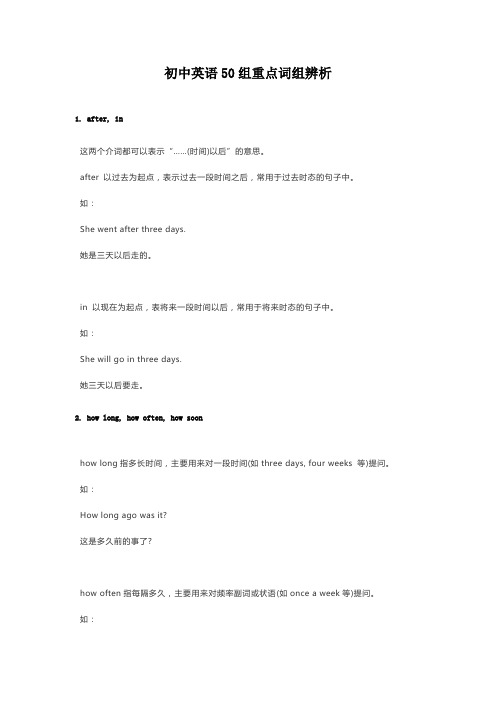
初中英语50组重点词组辨析1. after, in这两个介词都可以表示“……(时间)以后”的意思。
after 以过去为起点,表示过去一段时间之后,常用于过去时态的句子中。
如:She went after three days.她是三天以后走的。
in 以现在为起点,表将来一段时间以后,常用于将来时态的句子中。
如:She will go in three days.她三天以后要走。
2. how long, how often, how soonhow long指多长时间,主要用来对一段时间(如three days, four weeks 等)提问。
如:How long ago was it?这是多久前的事了?how often指每隔多久,主要用来对频率副词或状语(如once a week等)提问。
如:—How often does he come here? —Once a month.他(每隔)多久来一次?每月一次?how soon指再过多久,主要用来对表示将来的一段时间(in an hour, in two weeks 等)提问。
如:How soon can you come?你多快能赶来?3. few, a few, little, a little, several, somefew 和little的意思是否定的,表示“很少”或“几乎没有”;而a few和a little的意思是肯定的,表示“有一些,有一点儿”。
few 和a few修饰可数名词;little 和a little 修饰不可数名词。
several用于修饰可数名词,语意比a few和some更肯定,含有“好几个”的意思。
some可修饰可数名词,也可修饰不可数名词,从数量上说,它有时相当于a few 或a little,有时指更多一些的数量。
4. the other, anotherthe other 指两个人或事物中的“另一个”,表示特指。
常用英语词语辨析105组

1.elder 与elderly两者都为“年⽼的”,但有细微的差别。
elderly 指中年与暮年之间的年龄,表⽰⼈已过中年,因此,这词常⽤来代替 old。
如:an elderly gentleman. ⼀位年长的绅⼠。
elder指年龄稍长者,适⽤于家庭的兄弟姐妹之间。
如: Tom is the elder of the two.汤姆是两个孩⼦中较⼤的⼀个。
2.precious 和 expensiveexpensive 表⽰“昂贵的”。
如:The drink was cheap , but the food was very expensive . 饮料很便宜,但⾷物很贵。
precious 表⽰“珍贵的,宝贵的”。
如:The children are precious to me . 孩⼦们对我来说很重要。
3.regret to do 和 regret doingregret doing 表⽰“做了某事⽽感到遗憾或后悔”,v-ing 动作发⽣在regret 之前。
如:I regretted missing the train. 我为没有赶上⽕车⽽感到很懊恼。
regret to do 指“当时或现在遗憾地做什么”。
如:I regret to tell you that we can 't stay here any longer. 我遗憾地告诉你,我们不能在这⼉多呆了。
4.day by day 和 day after day两词组意思很近,但有区别:day by day 只⽤作状语,表⽰“⼀天天地”, 有逐渐转变的意思。
如:Day by day she seems to grow a little taller.她似乎⼀天天地长⾼了。
day after day 可作主语,宾语等,亦可作状语,表⽰“⼀天⼜⼀天”,强调动作的重复,表⽰时间的长久。
如: We do the same work day after day. 每天我们做着同样的事情。
初中英语常用词组辨析
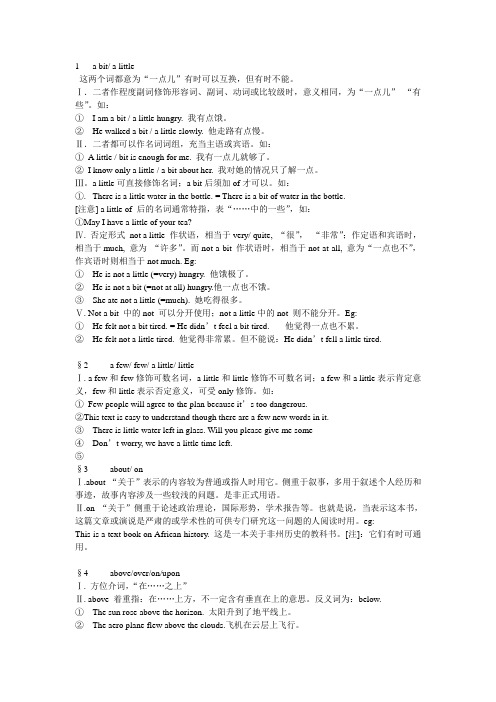
1 a bit/ a little这两个词都意为“一点儿”有时可以互换,但有时不能。
Ⅰ.二者作程度副词修饰形容词、副词、动词或比较级时,意义相同,为“一点儿”“有些”。
如:①I am a bit / a little hungry. 我有点饿。
②He walked a bit / a little slowly. 他走路有点慢。
Ⅱ.二者都可以作名词词组,充当主语或宾语。
如:①A little / bit is enough for me. 我有一点儿就够了。
②I know only a little / a bit about her. 我对她的情况只了解一点。
Ⅲ。
a little可直接修饰名词;a bit后须加of才可以。
如:①. There is a little water in the bottle. = There is a bit of water in the bottle.[注意] a little of 后的名词通常特指,表“……中的一些”,如:①May I have a little of your tea?Ⅳ. 否定形式not a little 作状语,相当于very/ quite, “很”,“非常”;作定语和宾语时,相当于much, 意为“许多”。
而not a bit 作状语时,相当于not at all, 意为“一点也不”,作宾语时则相当于not much. Eg:①He is not a little (=very) hungry. 他饿极了。
②He is not a bit (=not at all) hungry.他一点也不饿。
③She ate not a little (=much). 她吃得很多。
Ⅴ. Not a bit 中的not 可以分开使用;not a little中的not 则不能分开。
Eg:①He felt not a bit tired. = He didn’t feel a bit tired. 他觉得一点也不累。
人教七八年级易混淆词组辨析
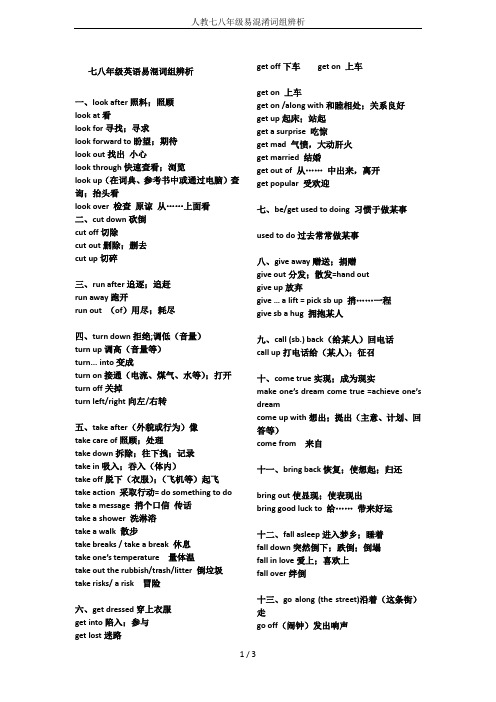
七八年级英语易混词组辨析一、look after照料;照顾look at看look for寻找;寻求look forward to盼望;期待look out找出小心look through快速查看;浏览look up(在词典、参考书中或通过电脑)查询;抬头看look over 检查原谅从……上面看二、cut down砍倒cut off切除cut out删除;删去cut up切碎三、run after追逐;追赶run away跑开run out (of)用尽;耗尽四、turn down拒绝;调低(音量)turn up调高(音量等)turn... into变成turn on接通(电流、煤气、水等);打开turn off关掉turn left/right向左/右转五、take after(外貌或行为)像take care of照顾;处理take down拆除;往下拽;记录take in吸入;吞入(体内)take off脱下(衣服);(飞机等)起飞take action 采取行动= do something to do take a message 捎个口信传话take a shower 洗淋浴take a walk 散步take breaks / take a break 休息take one’s temperature 量体温take out the rubbish/trash/litter 倒垃圾take risks/ a risk 冒险六、get dressed穿上衣服get into陷入;参与get lost迷路get off下车get on 上车get on 上车get on /along with和睦相处;关系良好get up起床;站起get a surprise 吃惊get mad 气愤,大动肝火get married 结婚get out of 从……中出来,离开get popular 受欢迎七、be/get used to doing 习惯于做某事used to do过去常常做某事八、give away赠送;捐赠give out分发;散发=hand outgive up放弃give … a lift = pick sb up 捎……一程give sb a hug 拥抱某人九、call (sb.) back(给某人)回电话call up打电话给(某人);征召十、come true实现;成为现实make one’s dream come true =achieve one’s dreamcome up with想出;提出(主意、计划、回答等)come from 来自十一、bring back恢复;使想起;归还bring out使显现;使表现出bring good luck to 给……带来好运十二、fall asleep进入梦乡;睡着fall down突然倒下;跌倒;倒塌fall in love爱上;喜欢上fall over绊倒十三、go along (the street)沿着(这条街)走go off(闹钟)发出响声go out外出(娱乐)go straight 直走go online 上网go to the movies 看电影十四、make sure确保;查明make up编造(故事、谎言等)make a choice /choices 做出选择make a difference 影响有作用make a mess 弄得一团糟make an effort 作出努力make friends with sb 和某人交朋友make one’s bed 铺床make one’s own decision 自己做决定make soup 做汤十五、put off推迟put up搭起;举起张贴put sth. to good use好好利用某物put away 收好,放好put down 写下记下十六、set out出发;启程set up建起;建立十七、have a cold/ stomachache/fever 感冒/胃疼/发烧/have a conversation with…和……交谈have a look 看一看have a point 有道理have… in common 有相同特征have to do with 与……有关十八、keep… away from 避免接近,远离Keep / stop/ prevent sb from doing sth 阻止某人做某事十九、feel free to do 随便做某事feel like doing sth 愿意喜欢做某事feel like 给……感觉,感受到二十、play a part in 参与某事play a role 发挥作用,有影响play chess 下棋play volleyball 打排球play the piano 弹钢琴二十一、call up打电话给(某人);征召cheer up(使)变得更高兴;振奋起来clean up打扫(或清除)干净cut up切碎dress up装扮;乔装打扮end up最终成为;最后处于fix up修理;装饰give up放弃grow up长大;成熟hurry up赶快;急忙look up查找make up编造(故事、谎言等)pick up捡起;接电话put up搭起;举起stay up熬夜wake up醒;叫醒二十二、blow out吹灭bring out使显现;使表现出check out察看;观察clear out清理;丢掉find out查明;弄清give out分发;散发go out外出(娱乐)hand out分发hang out闲逛;常去某处lay out摆开;布置run out (of)用尽;耗尽sell out卖光set out出发;启程work out成功地发展;解决eat out 出去吃饭try out 参加选拔试用watch out 当心小心=look out二十三、let... down使失望lie down躺下write down写下;记录下up and down 上上下下take down 拆除记录二十四、agree with同意;赞成、disagree with 反对compare... with比较;对比connect... with把……和……连接或联系起来deal with应付;处理part with放弃、交出(尤指不舍得的东西)along with 连同,除……以外help sb with sth 在某方面帮助某人provide sb with sth 为某人提供某物二十五、care bout 关心在意care for 照顾喜欢take care of = look after 照顾二十六、think about 思考思索think of 认为二十七、ask for 请求care for 照顾喜欢pay for 付费prepare for 为……做准备thank sb for …为……而感谢二十八、hear from 接到某人的信、电话prevent sb from doing sth 阻止某人做某事protect sb from doing sth 保护某人不受伤害keep sb away from 使某人远离,避免接近二十九、belong to 属于listen to 听……pay attention to 注意关注talk to 跟……说三十、as for 至于,关于at least 至少at last 最后at good prices 以非常合理的价钱三十二、in a row 连续几次in fact 实际上in half 分成两半in line with 与……成一排in one’s opinion 依……看in order to 目的是为了in person 亲自in public 公开的in silence 沉默无声的in that case 既然那样in the end 最后in the face of 面对三十三、according to 依据to be honest 说实在的to one’s surprise 使……惊讶的,出乎意料的。
初中英语重点词汇辨析
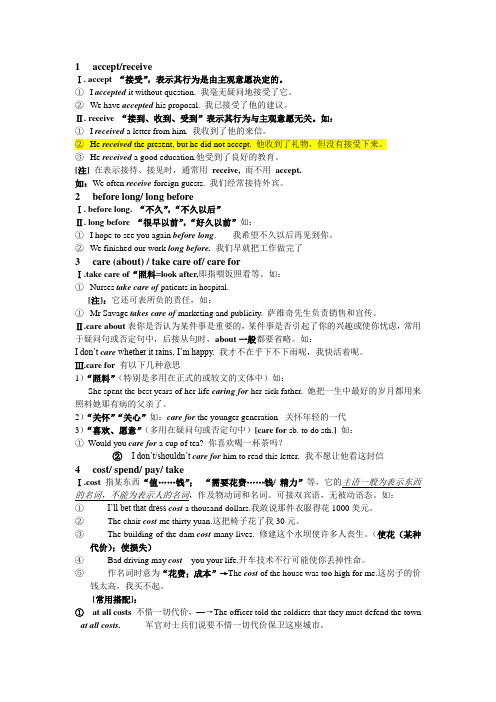
1 accept/receiveⅠ. accept “接受”,表示其行为是由主观意愿决定的。
①I accepted it without question. 我毫无疑问地接受了它。
②We have accepted his proposal. 我已接受了他的建议。
Ⅱ. receive “接到、收到、受到”表示其行为与主观意愿无关。
如:①I received a letter from him. 我收到了他的来信。
②He received the present, but he did not accept. 他收到了礼物,但没有接受下来。
③He received a good education.他受到了良好的教育。
[注] 在表示接待、接见时,通常用receive, 而不用accept.如:We often receive foreign guests. 我们经常接待外宾。
2 before long/ long beforeⅠ. before long. “不久”,“不久以后”Ⅱ. long before “很早以前”,“好久以前”如:①I hope to see you again before long. 我希望不久以后再见到你。
②We finished our work long before.我们早就把工作做完了3 care (about) / take care of/ care forⅠ.take care of“照料=look after,即指喂饭照看等。
如:①Nurses take care of patients in hospital.[注]:它还可表所负的责任,如:①Mr Savage takes care of marketing and publicity. 萨维奇先生负责销售和宣传。
Ⅱ.care about表你是否认为某件事是重要的,某件事是否引起了你的兴趣或使你忧虑,常用于疑问句或否定句中,后接从句时,about一般都要省略。
初中、高中英语单词及词组分类辨析(免费)
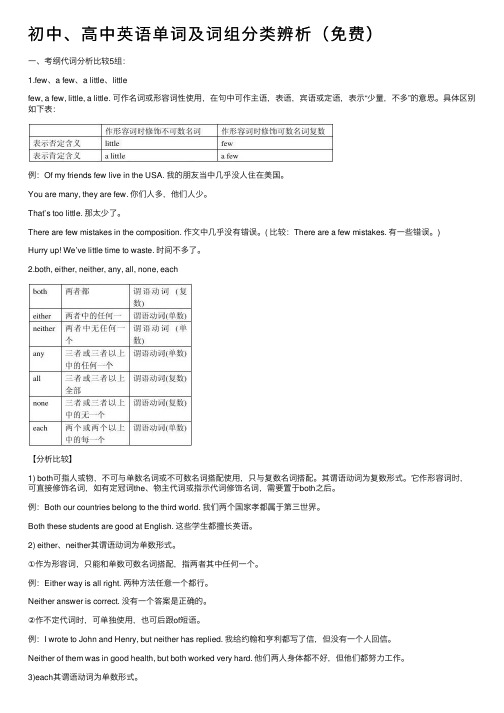
初中、⾼中英语单词及词组分类辨析(免费)⼀、考纲代词分析⽐较5组:1.few、a few、a little、littlefew, a few, little, a little. 可作名词或形容词性使⽤,在句中可作主语,表语,宾语或定语,表⽰“少量,不多”的意思。
具体区别如下表:例:Of my friends few live in the USA. 我的朋友当中⼏乎没⼈住在美国。
You are many, they are few. 你们⼈多,他们⼈少。
That’s too little. 那太少了。
There are few mistakes in the composition. 作⽂中⼏乎没有错误。
( ⽐较:There are a few mistakes. 有⼀些错误。
)Hurry up! We’ve little time to waste. 时间不多了。
2.both, either, neither, any, all, none, each【分析⽐较】1) both可指⼈或物,不可与单数名词或不可数名词搭配使⽤,只与复数名词搭配。
其谓语动词为复数形式。
它作形容词时,可直接修饰名词,如有定冠词the、物主代词或指⽰代词修饰名词,需要置于both之后。
例:Both our countries belong to the third world. 我们两个国家孝都属于第三世界。
Both these students are good at English. 这些学⽣都擅长英语。
2) either、neither其谓语动词为单数形式。
①作为形容词,只能和单数可数名词搭配,指两者其中任何⼀个。
例:Either way is all right. 两种⽅法任意⼀个都⾏。
Neither answer is correct. 没有⼀个答案是正确的。
②作不定代词时,可单独使⽤,也可后跟of短语。
例:I wrote to John and Henry, but neither has replied. 我给约翰和亨利都写了信,但没有⼀个⼈回信。
- 1、下载文档前请自行甄别文档内容的完整性,平台不提供额外的编辑、内容补充、找答案等附加服务。
- 2、"仅部分预览"的文档,不可在线预览部分如存在完整性等问题,可反馈申请退款(可完整预览的文档不适用该条件!)。
- 3、如文档侵犯您的权益,请联系客服反馈,我们会尽快为您处理(人工客服工作时间:9:00-18:30)。
56.quite ,very 很,十分
1)quite a +形容词+名词“一个相当……的……”quite a clever boy 一个相当聪明的男孩2)a very+形容词+名词“一个非常……的”a very clever boy 一个非常聪明的男孩
57.say,speak,talk,tell 说
1)say 后接说的内容,He says he likes English very much.
2)speak 后接语言,I can speak Japanese
3)talk “讨论,谈论”,可作动词也可作名词,talk about sth 谈论某件事,talk with /to sb 和某人谈话
4)tell ,“告诉,讲述”tell sb sth 告诉某人某件事,tell a story ,tell a lie 撒谎
58.since, for 用于完成时态
1)since 后接时间点. Lucy has lived there since 1955. Lucy 自从1955年以来一直住在这里。
接“时间段+ago”I have been teaching since 10 years ago. 我教英语有10年了
接“一般过去时态的句子”We have known each other since we were young.我们从小就认识。
2)for 后接时间段。
We have studied for 9 years.我们学英语已经9年了。
59. so , such,如此,这样。
So /such ……that+否定句子=too……to+动词原形;so/such…+肯定句子=enough to+动词原形
1)so,修饰形容词或many,much,little,few
(so good a boy 如此好的一个男孩)(so much difficult 太多的困难)
He is so young that he can’t go to school=He is too young to go to school.他太小了,不能去上学。
He is so tall that he can reach it=He is tall enough to reach it
2)such ,修饰名词。
She is such a careful girl.她是一个如此细心的女孩。
60. sometimes有时,sometime(过去或将来)的某个时候,
some times几次,几倍,some time一段时间
61.surprise, surprised , surprising; 奇异
1)surprise 动词,“使惊奇,使诧异”常搭配:in surprise “惊奇地,惊讶地”修饰动词He looked at me in surprise.他惊讶的看着我。
To one’s surprise“使某人感到惊奇的是”
2)surprised 形容词,“感到惊奇的”修饰人。
Be surprised at 对……感兴趣
3)surprising 形容词,“令人惊奇的”形容物
63. till ,until 到……的时候为止
1)till“到……时候为止”意为动作一直持续到……结束,肯定句中的谓语必须是延续性动词。
I worked till late night. 我一直公共到深夜。
2)not…until“直到……才……”否定句中的谓语必须是终止性动词。
She didn't get up until her mother came in. 直到妈妈进来她才起床。
注意:till 和until 通常情况下可以互换,只是在句首时until 比till 更常用。
64. because ,because of
1)because +句子。
He was late because it rained heavily.
2) because of +名词,代词或名词词组。
He was late because of the heavy rain.
65. unless,if 都用于条件状语从句
1)unless 是“除非,如果不”,相当于=if not
2)if 是“如果,假如”的意思。
If you don’t study hard ,you will fall behind.
=You will fall behind unless you study hard.如果你不努力学习,你就会落后的。
注意:if 还可以用于宾从,是“是否”的意思
I want to know if he will come here tomorrow.我想知道明天他是否会来这里。
65.when while “当……时候”
1)when 引导的从句谓语动词可以是延续性,也可以是短暂性的
We were talking when the teacher came in. 老师进来的时候我们正在讲话。
I was walking on the stress when it began to rain.我在街上散步的时候,突然下雨了。
2)while 引导的从句谓语动词必须是持续性的
I was reading while my brother was playing computer弟弟在玩电脑的时候我在看书。
While 还可以表示转折,“然而”。
I like pop music ,while my brother likes classic music.
67. whole , all 整个,所有,全部
1)冠词+whole +名词。
The whole family 整个家庭
2)all+冠词+名词all the students 全部的学生。
68. a number of ,the number of
1)a number of =many 非常多,大量的(后接可数名词)
There are a number of students in our school. 我们学校有很多学生。
1)the number of ……的数量(做主语时,谓语动词只能用单数)
The number of the students in our school is 5000.我校学生的人数是5000
69. at the end of ,by the end of ,in the end 。
1)at the end of ……在……之末(后接时间或地点)
2)by the end of ……到……末未止(后接时间,如果是过去的时间,用于过去完成时)We had learned about 3000 words by the end of last term.到上个学期末未止,我们已经学习了大约3000个单词。
3)in the end =at last =finally最后,终于
70.Be famous for ,be famous as
1)be famous for 以……而著名。
China is famous for the Great Wall.
2) be famous as 作为……而有名Li Yuhun is famous as a singer.李宇春作为一名歌手而有名。
71.be made of, be made from , be made in be made by
1)be made of 由…制成(看得出原材料)The bed is made of wood.
2)be made from 由……制成(看不出原材料)The wine is made from rice.
3) be made in 在……制成
4)be made by 是谁……制作的
72.be ill in bed,on the bed
1)be in bed 卧病在床(睡在床上)2)on the bed在床上(不一定在睡觉)
73.in front ,in front of ,in the front of
1)in front在前面He is in front.他在前面
2)in front of 在……前面(范围之外)
There are three trees in front of our classroom. 在我们教师前面有三棵树(教师外面)
2)in the front of 在……前部(范围之内)
There is a computer in the front of our classroom.在我们教师前面有一台电脑(教师里面)74.go to bed, go to sleep , fall sleep
1)go to bed 上床,上床睡觉(强调上床的动作)
I usually go to bed at 10:00我经常十点上床睡觉
2)go to sleep 入睡,睡着(强调从醒到睡着的过程)
What time do the kids usually for to sleep?孩子们经常九点睡着?
3)fall sleep 入睡,(强调睡着了的状态)
He fell asleep sitting in his chair. 我坐在椅子上睡着了。
75.too much ,much too
1)too much 太多,接不可数名词
2)much too 太,接形容词或副词。
